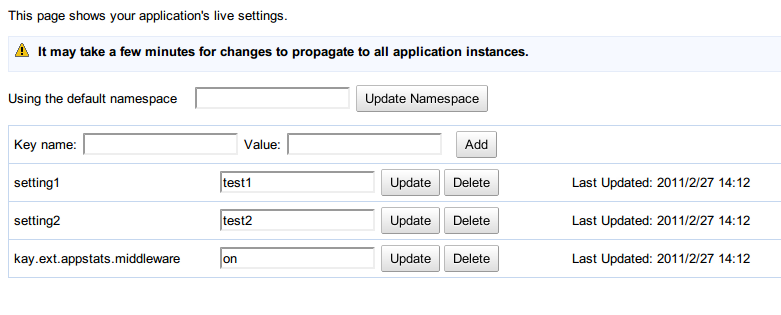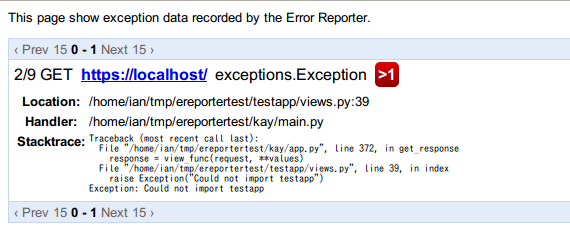Kay 1.1 Released!
The Kay team just just released Kay 1.1! I want to thank Takashi Matsuo, Nickolas Daskalou, Tasuku Suenaga, and Yosuke Suzuki for their hard work on this release.
Kay is a web framework made specifically for Google App Engine. The basic design of Kay is based on the Django framework, such as middleware, settings, pluggable applications, etc. Kay uses Werkzeug as lower level framework, Jinja2 as template engine, and babel for handling language translations.
Kay 1.1 contains a number of new features and bug fixes. You can see the Release Notes here and can download the release here.
We’re excited about this release so I would like to introduce a few of Kay’s new features.
cron_only
Kay has a new utility decorator for securing cron views so they can only be run by the cron system on App Engine.
@cron_only
def my_cron_view(request):
# ...
return response
You can see the documentation for the cron_only decorator
here.
Pagination API
We added a new Pagination API which will allow developers to quickly and easily implement pagination in their views.
from kay.utils.paginator import Paginator, InvalidPage, EmptyPage
from kay.utils import render_to_response
def listing(request):
contact_list = Contacts.all()
paginator = Paginator(contact_list, 25) # Show 25 contacts per page
# Make sure page request is an int. If not, deliver first page.
try:
page = int(request.args.get('page', '1'))
except ValueError:
page = 1
# If page request (9999) is out of range, deliver last page of results.
try:
contacts = paginator.page(page)
except (EmptyPage, InvalidPage):
contacts = paginator.page(paginator.num_pages)
return render_to_response('list.html', {"contacts": contacts})
Page objects can be used in views to display information about the current page and item indexes.
{% for contact in contacts.object_list %}
{# Each "contact" is a Contact model object. #}
{{ contact.full_name|upper }}<br />
...
{% endfor %}
<div class="pagination">
<span class="step-links">
{% if contacts.has_previous %}
<a href="?page={{ contacts.previous_page_number }}">previous</a>
{% endif %}
<span class="current">
Page {{ contacts.number }} of {{ contacts.paginator.num_pages }}.
</span>
{% if contacts.has_next %}
<a href="?page={{ contacts.next_page_number }}">next</a>
{% endif %}
</span>
</div>
The Pagination API is designed to make as few Datastore RPC calls as possible.
For instance, if you don’t use the num_pages or count properties, the
Pagination API will not make a count() RPC call.
You can view the Pagination API documentation here.
Live Settings
Redeploying applications can create latency spikes in your application because
it requires stopping and restarting all of your application instances. Kay 1.1
adds a new kay.ext.live_settings application which provides an API for storing
global settings that can be changed without redeploying your application.
Live Settings are stored with a unicode key to unicode value, and work much like memcached, but provide a fast, persistent, and eventually consistent way of storing and getting settings. Live Settings can be changed programmatically:
from kay.ext.live_settings import live_settings
value = live_settings.get("my.settings.key", "default_value")
live_settings.set("my.settings.key", "new-value")
Or they can be managed via a custom Admin page:

You can read the Live Settings documentation here
AppStatsMiddleware
Kay 1.1 adds a new AppStatsMiddleware that allows you to easily enable Appstats. You simply add the middleware to your MIDDLEWARE_CLASSES in order to enable Appstats.
MIDDLEWARE_CLASSES = (
# ...
'kay.ext.appstats.middleware.AppStatsMiddleware',
# ...
)
The AppStatsMiddleware can work with the Live Settings API and can be enabled
and disabled without redeploying your application. You can read the
documentation for the AppStats extension
here
EReporter
Kay 1.1 adds a new kay.ext.ereporter application which will catch and save
information about errors for later viewing and can send out daily error reports.
The EReporter application works much like the EReporter in the App Engine
SDK
but provides a convenient way of viewing the errors via a custom admin page and
integrates with Kay’s ADMINS and email related settings.

You can read the documentation for the EReporter extension here.
Conclusion
Kay 1.1 adds a number of new features which we hope will make development and management of applications on App Engine easier.
As always we would love to hear from you! Please check out Kay’s project page. We encourage you to send us bug reports and feature requests via our issues page as well as give us feedback on the mailing list. We are also looking forward to Kay 2.0 so if you have any suggestions about any large new features now is the time to let us know!
We look forward to hearing feedback about Kay!
